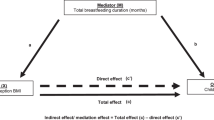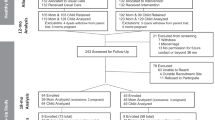Abstract
Background/Objectives:
Maternal adiposity is known to affect breastfeeding initiation and duration via both antenatal and postnatal factors. This study investigates associations between maternal pregravid body mass index (BMI), breastfeeding duration and antenatal breastfeeding confidence, intention and social comfort among primiparous Australian women.
Subjects/Methods:
Women in their first pregnancy (n=462) were recruited by convenience sampling in Queensland, Australia. Participants responded to an antenatal and six postnatal questionnaires during their infants’ first year between June 2010 and March 2012. Maternal pregravid BMI was examined against breastfeeding duration, participants’ antenatal infant feeding intentions and measures of breastfeeding confidence and social comfort.
Results:
Breastfeeding initiation in this cohort was 97%, but 46% of mothers had ceased breastfeeding at 52 weeks postpartum. Breastfeeding duration differed significantly (χ2 (2)=7.21, P=0.007) between normal, overweight and obese women. No differences were found in antenatal intention for feeding type nor intended breastfeeding duration by one-way ANOVA (F(2,178)=1.77, P=0.17). More than half of the pregnant respondents anticipated social discomfort breastfeeding in public, with obese women significantly more likely to anticipate discomfort breastfeeding in the presence of close female friends, (χ2 (1)=5.53, P=0.019).
Conclusions:
This study confirmed the risk of premature cessation of breastfeeding for obese mothers. Interventions during pregnancy that address body image issues in relation to breastfeeding may facilitate breastfeeding success for obese mothers and their infants and accrue short- and long-term health benefits for both.
This is a preview of subscription content, access via your institution
Access options
Subscribe to this journal
Receive 12 print issues and online access
$259.00 per year
only $21.58 per issue
Buy this article
- Purchase on Springer Link
- Instant access to full article PDF
Prices may be subject to local taxes which are calculated during checkout

Similar content being viewed by others
References
Giles L, Whitrow M, Davies M, Davies C, Rumbold A, Moore V . Growth trajectories in early childhood, their relationship with antenatal and postnatal factors, and development of obesity by age 9 years: results from an Australian birth cohort study. Int J Obes 2015; 39: 1049–1056.
World Health OrganizationEssential Nutrition Actions: Improving Maternal, Newborn, Infant and Young Child Health and Nutrition. World Health Organization: Geneva, 2013.
Weyermann M, Rothenbacher D, Brenner H . Duration of breastfeeding and risk of overweight in childhood: a prospective birth cohort study from Germany. Int J Obes 2006; 30: 1281–1287.
de Beer M, Vrijkotte TGM, Fall CHD, van Eijsden M, Osmond C, Gemke RJBJ . Associations of infant feeding and timing of linear growth and relative weight gain during early life with childhood body composition. Int J Obes 2015; 39: 586–592.
Chivers P, Hands B, Parker H, Bulsara M, Beilin L, Kendall G et al. Body mass index, adiposity rebound and early feeding in a longitudinal cohort (Raine Study). Int J Obes 2010; 34: 1169–1176.
Rueter K, Haynes A, Prescott SL . Developing primary intervention strategies to prevent allergic disease. Curr Allergy Asthma Rep 2015; 15: 1–12.
Burke V, Beilin LJ, Simmer K, Oddy WH, Blake KV, Doherty D et al. Breastfeeding and overweight: longitudinal analysis in an Australian birth cohort. J Pediatr 2005; 147: 56–61.
Ornoy A . Prenatal origin of obesity and their complications: gestational diabetes, maternal overweight and the paradoxical effects of fetal growth restriction and macrosomia. Reprod Toxicol 2011; 32: 205–212.
Wolfe H . High prepregnancy body-mass index—a maternal-fetal risk factor. N Engl J Med 1998; 338: 191–192.
Ajslev T, Andersen C, Gamborg M, Sørensen T, Jess T . Childhood overweight after establishment of the gut microbiota: the role of delivery mode, pre-pregnancy weight and early administration of antibiotics. Int J Obes 2011; 35: 522–529.
Huda SS, Brodie LE, Sattar N . Obesity in pregnancy: prevalence and metabolic consequences. Semin Fetal Neonatal Med 2010; 15: 70–76.
Oddy WH, Li J, Landsborough L, Kendall GE, Henderson S, Downie J . The association of maternal overweight and obesity with breastfeeding duration. J Pediatr 2006; 149: 185–191.
Donath SM, Amir LH . Does maternal obesity adversely affect breastfeeding initiation and duration? J Paediatr Child Health 2000; 36: 482–486.
Brands B, Demmelmair H, Koletzko B . Early life programming of obesity through perinatal nutrition. Eur Gastro Hepatol Rev 2011; 7: 246–250.
Bobrow KL, Quigley MA, Green J, Reeves GK, Beral V . Million Women Study Collaborators. Persistent effects of women's parity and breastfeeding patterns on their body mass index: results from the Million Women Study. Int J Obes 2013; 37: 712–717.
Rasmussen KM . Association of maternal obesity before conception with poor lactation performance. Annu Rev Nutr 2007; 27: 103–121.
Brown A, Jordan S . Impact of birth complications on breastfeeding duration: an internet survey. J Adv Nurs 2013; 69: 828–839.
Hilson JA, Rasmussen KM, Kjolhede CL . Excessive weight gain during pregnancy is associated with earlier termination of breast-feeding among white women. J Nutr 2006; 136: 140–146.
Amir LH, Donath S . A systematic review of maternal obesity and breastfeeding intention, initiation and duration. BMC Pregnancy Childbirth 2007; 7: 9.
Wambach KA, Cohen SM . Breastfeeding experiences of urban adolescent mothers. J Pediatr Nurs 2009; 24: 244–254.
Haughton J, Perez-Escamilla R, Gregorio D . Factors associated with breastfeeding duration among Connecticut Special Supplemental Nutrition Program for Women, Infants, and Children (WIC) participants. J Hum Lact 2010; 26: 266–273.
Dyson L, Green JM, Renfrew MJ, McMillan B, Woolridge M . Factors influencing the infant feeding decision for socioeconomically deprived pregnant teenagers: the moral dimension. Birth 2010; 37: 141–149.
Alexander A, Dowling D, Furman L . What do pregnant low-income women say about breastfeeding? Breastfeed Med 2010; 5: 17–23.
Donath SM, Amir LH . ALSPAC Study Team. Relationship between prenatal infant feeding intention and initiation and duration of breastfeeding: a cohort study. Acta Paediatr 2003; 92: 352–356.
Hauff LE, Leonard SA, Rasmussen KM . Associations of maternal obesity and psychosocial factors with breastfeeding intention, initiation, and duration. Am J Clin Nutr 2014; 99: 524–534.
Kitsantas P, Gallo S, Palla H, Nguyen V, Gaffney K . Nature and nurture in the development of childhood obesity: early infant feeding practices of overweight/obese mothers differ compared to mothers of normal body mass index. J Matern Fetal Neonatal Med 2016; 29: 290–293.
Australian Bureau of Statistics. 3101.0 - Australian Demographic Statistics, Jun 2015 Canberra: A; 2015 (cited 22 December 2015). Available from http://www.abs.gov.au/ausstats/abs@.nsf/mf/3101.0.
Newby R, Brodribb W, Ware RS, Davies PSW . Internet use by first-time mothers for infant feeding support. J Hum Lact 2015; 31: 416–424.
Fein SB, Labiner-Wolfe J, Shealy KR, Li RW, Chen J, Grummer-Strawn LM . Infant Feeding Practices Study II: study methods. Pediatrics 2008; 122: S28–S35.
Australian Bureau of Statistics Census of Population and Housing: Socio-Economic Indexes for Areas (SEIFA), Australia, 2011. Government of Australia: Canberra, 2011.
Donath SM, Amir LH . Maternal obesity and initiation and duration of breastfeeding: data from the longitudinal study of Australian children. Matern Child Nutr 2008; 4: 163–170.
Forster DA, McLachlan HL, Lumley J . Factors associated with breastfeeding at six months postpartum in a group of Australian women. Int Breastfeed J 2006; 1: 18.
Li R, Jewell S, Grummer-Strawn L . Maternal obesity and breast-feeding practices. Am J Clin Nutr 2003; 77: 931–936.
Turcksin R, Bel S, Galjaard S, Devlieger R . Maternal obesity and breastfeeding intention, initiation, intensity and duration: a systematic review. Matern Child Nutr 2014; 10: 166–183.
Guelinckx I, Devlieger R, Bogaerts A, Pauwels S, Vansant G . The effect of pre-pregnancy BMI on intention, initiation and duration of breast-feeding. Public Health Nutr 2012; 15: 840.
Hilson JA, Rasmussen KM, Kjolhede CL . High prepregnant body mass index is associated with poor lactation outcomes among white, rural women independent of psychosocial and demographic correlates. J Hum Lact 2004; 20: 18–29.
Turcksin R, Bel S, Galjaard S, Devlieger R . Maternal obesity and breastfeeding intention, initiation, intensity and duration: a systematic review. Matern Child Nutr 2014; 10: 166–183.
Brown A, Rance J, Warren L . Body image concerns during pregnancy are associated with a shorter breast feeding duration. Midwifery 2015; 31: 80–89.
Skouteris H, Carr R, Wertheim EH, Paxton SJ, Duncombe D . A prospective study of factors that lead to body dissatisfaction during pregnancy. Body Image 2005; 2: 347–361.
Leeming D, Williamson I, Lyttle S, Johnson S . Socially sensitive lactation: exploring the social context of breastfeeding. Psychol Health 2013; 28: 450–468.
Zanardo V, Gambina I, Nicolo ME, Giustardi A, Cavallin F, Straface G et al. Body image and breastfeeding practices in obese mothers. Eat Weight Disord 2014; 19: 89–93.
Hauff LE, Demerath EW . Body image concerns and reduced breastfeeding duration in primiparous overweight and obese women. Am J Hum Biol 2012; 24: 339–349.
Cash TF, Fleming EC, Alindogan J, Steadman L, Whitehead A . Beyond body image as a trait: the development and validation of the body image states scale. Eat Disord 2002; 10: 103–113.
Mehta UJ, Siega-Riz AM, Herring AH . Effect of body image on pregnancy weight gain. Matern Child Health J 2011; 15: 324–332.
Hodgkinson EL, Smith DM, Wittkowski A . Women's experiences of their pregnancy and postpartum body image: a systematic review and meta-synthesis. BMC Pregnancy Childbirth 2014; 14: 330.
Li R, Scanlon KS, Serdula MK . The validity and reliability of maternal recall of breastfeeding practice. Nutr Rev 2005; 63: 103–110.
Gorber SC, Tremblay M, Moher D, Gorber B . A comparison of direct vs. self‐report measures for assessing height, weight and body mass index: a systematic review. Obes Rev 2007; 8: 307–326.
Yoong SL, Carey ML, D’Este C, Sanson-Fisher RW . Agreement between self-reported and measured weight and height collected in general practice patients: a prospective study. BMC Med Res Methodol 2013; 13: 1–8.
Acknowledgements
We acknowledge and extend our appreciation to all of the participants in the Feeding Queensland Babies Study. This research has been funded by the Queensland Government, Department of Health, and hosted by Children’s Health Queensland’s Centre for Children’s Health and Wellbeing.
Author information
Authors and Affiliations
Corresponding author
Ethics declarations
Competing interests
The authors declare no conflict of interest.
Rights and permissions
About this article
Cite this article
Newby, R., Davies, P. Antenatal breastfeeding intention, confidence and comfort in obese and non-obese primiparous Australian women: associations with breastfeeding duration. Eur J Clin Nutr 70, 935–940 (2016). https://doi.org/10.1038/ejcn.2016.29
Received:
Revised:
Accepted:
Published:
Issue Date:
DOI: https://doi.org/10.1038/ejcn.2016.29
This article is cited by
-
Pregorexia: a systematic review and meta-analysis on the constructs of body image dissatisfaction and eating disturbances by gestational age in the peripartum
Eating and Weight Disorders - Studies on Anorexia, Bulimia and Obesity (2023)
-
Nurses’ and midwives’ perspectives on how the pursuit for the ‘perfect’ body image affects their own breastfeeding practices: a qualitative study in Ghana
International Breastfeeding Journal (2021)
-
“You just need to leave the room when you breastfeed” Breastfeeding experiences among obese women in Sweden – A qualitative study
BMC Pregnancy and Childbirth (2018)



